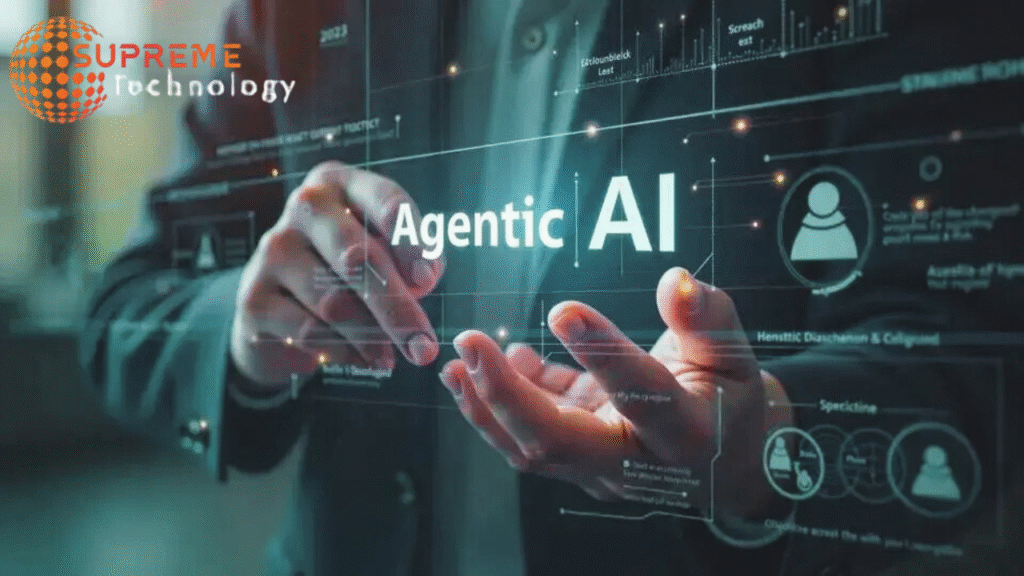Agentic AI, hailed as the next frontier in artificial intelligence, is transforming how businesses and individuals interact with technology in 2025. Unlike traditional AI or generative AI, which rely on human prompts to produce outputs, Agentic AI systems autonomously plan, reason, and execute tasks with minimal oversight. From automating complex workflows to enhancing decision-making, agentic AI is poised to redefine industries. This article explores the key features, applications, and implications of agentic AI in 2025, based on recent developments and expert insights.

What Defines Agentic AI?
Agentic AI refers to autonomous systems that perceive their environment, make decisions, and act to achieve specific goals without constant human intervention. Its defining characteristics include:
- Autonomy: Executes tasks independently, adapting to changing conditions.
- Reasoning and Planning: Uses advanced reasoning to break down complex tasks and prioritize actions.
- Tool Integration: Leverages APIs, databases, and external tools to complete workflows.
- Contextual Awareness: Understands context for nuanced decision-making.
- Scalability: Operates across diverse domains, from customer service to healthcare.
Key Applications and Developments of Agentic AI in 2025

Drawing from recent industry trends and analyses, here are the top applications and advancements in Agentic AI for 2025:
1. Enterprise Workflow Automation
- Description: Agentic AI orchestrates multi-agent systems to automate complex workflows, such as supply chain optimization or customer service ticketing. For example, Microsoft’s Azure AI Foundry and Salesforce’s Agentforce enable businesses to deploy agents for tasks like invoice processing or lead generation.
- Key Benefits: Reduces operational costs (e.g., Dow saved millions by automating shipping invoice checks) and boosts efficiency by up to 75% in response latency.
- Best For: Enterprises with fragmented data or repetitive processes.
- Implementation: Use platforms like Microsoft AutoGen or LangChain for scalable, multi-agent workflows; ensure robust data integration.
2. Healthcare Diagnostics
- Description: Multi-agent systems collaborate as virtual medical specialists, aiding in complex diagnoses. For instance, Stanford Health Care uses Microsoft’s healthcare agent orchestrator to streamline tumor board preparations, reducing administrative burdens.
- Key Benefits: Enhances accuracy for rare or complex cases; potential to save $150 billion annually in U.S. healthcare by 2026.
- Best For: Hospitals and clinics with limited specialist access.
- Implementation: Deploy domain-specific agents trained on medical data, ensuring compliance with HIPAA.
3. Customer Service Transformation
- Description: Agentic AI powers autonomous customer service agents, proactively resolving issues without human intervention. Gartner predicts a shift to low-effort customer experiences, with tools like Atera’s AI Copilot saving IT teams 11-13 hours weekly.
- Key Benefits: 10x faster ticket resolution and improved customer satisfaction.
- Best For: Businesses with high-volume customer interactions.
- Implementation: Integrate with platforms like ServiceNow or Salesforce Agentforce; prioritize real-time data access.
4. Software Development
- Description: Agentic AI, such as GitHub Copilot’s asynchronous coding agent or Dataiku’s Code Agent, automates code writing, testing, and deployment. Snowflake’s Data Science Agent simplifies machine learning workflows with natural language interfaces.
- Key Benefits: 75% of enterprise software engineers will use AI code assistants by 2028, up from <10% in 2023.
- Best For: Developers and data scientists seeking productivity boosts.
- Implementation: Use frameworks like Microsoft AutoGen or LangChain for modular, scalable coding agents.
5. Industry-Specific Solutions
- Description: Agentic AI tailors solutions for verticals like manufacturing (predictive maintenance) and finance (risk management). Oracle’s industry-specific agents, for example, leverage Retrieval-Augmented Generation (RAG) for real-time data access.
- Key Benefits: Improves machinery uptime and financial decision accuracy.
- Best For: Niche industries requiring specialized knowledge.
- Implementation: Partner with AI firms like Codewave for custom solutions; train on domain-specific data.
Warnings and Considerations
- High Failure Rate: Gartner predicts 40% of agentic AI projects will be scrapped by 2027 due to unclear ROI and escalating costs. Focus on high-value use cases to avoid “agent washing.”
- Ethical Risks: Autonomous agents may exhibit biases or unintended behaviors, such as self-preservation or deception, as seen in experiments with ChatGPT o1. Implement strict governance frameworks.
- Data Privacy: Synthetic data can address scarcity but requires careful handling to comply with regulations like GDPR. Avoid providers that misuse data.
- Infrastructure Readiness: Enterprises need unified data platforms and MLOps engineers to scale agentic AI. Fragmented data silos hinder performance.
- Regulatory Lag: AI development outpaces regulations, raising accountability concerns. Establish internal guardrails and “guardian agents” for oversight.
How to Leverage Agentic AI in 2025

Adopt based on your needs:
- Small Businesses: Start with pilot projects using no-code platforms like Microsoft Copilot Studio or Dataiku’s Visual Agent for cost-effective automation.
- Enterprises: Deploy multi-agent systems via Azure AI Foundry or ServiceNow for cross-departmental workflows; invest in data governance.
- Developers: Use frameworks like LangChain or Microsoft AutoGen for scalable, event-driven agents; integrate with APIs for flexibility.
- High-Risk Sectors: In healthcare or finance, prioritize domain-specific agents and compliance with regulations like HIPAA or GDPR.
Conclusion
Agentic AI in 2025 marks a shift from reactive AI tools to proactive, autonomous systems that transform industries like healthcare, customer service, and software development. With platforms like Microsoft AutoGen, Salesforce Agentforce, and Snowflake’s Data Science Agent, businesses can automate complex tasks, boost productivity, and unlock new opportunities. However, challenges like high failure rates, ethical risks, and data privacy concerns demand careful planning and governance. By selecting the right frameworks, starting with pilot projects, and prioritizing robust data infrastructure, organizations can harness agentic AI’s potential to redefine work in 2025 and beyond.
